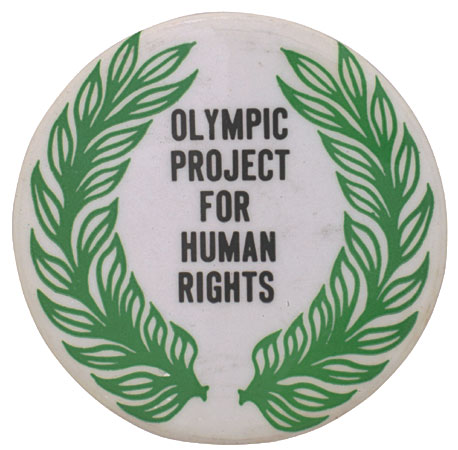How could they disrespect the American flag?
How dare they use their victory as a political platform?
Why would they air domestic matter at an apolitical and international event?
How could they be so ungrateful to a country that they should be honored to represent?
Tommie Smith and John Carlos won gold and bronze (respectively) in the 200 meter track race in the 1968 Summer Olympics in Mexico City, Mexico. At the medal ceremony while the United States anthem was played, they wore black gloves on raised fists. They bowed their heads.
Their black socks without any shoes represented Black poverty at home. They wore Olympic Project for Human Rights (OPHR) badges to identify their cause. Carlos unzipped his tracksuit in solidarity with blue-collar workers, and wore a beaded necklace "for those individuals that were lynched, or killed and that no-one said a prayer for, that were hung and tarred. It was for those thrown off the side of the boats in the middle passage."
They were booed off the field and expelled from the rest of the Games. They received death threats against themselves and against their families. Smith was fired from his job. Carlos's marriage ended in divorce, and his ex-wife later committed suicide.
It was a steep price, but both athletes to this day affirm they would do it again. Smith said "If I win, I am American, not a black American. But if I did something bad, then they would say I am a Negro. We are black and we are proud of being black. Black America will understand what we did tonight."
They were asked to compartmentalize their identities. To ignore how they were treated at home for the sake of American success abroad. They were asked to be "just Americans" when that right was never afforded to them in their daily reality.
In a country that limits the value of Black lives to their roles as entertainers and athletes, they were given a podium and they could not let the moment go by. They used their platform to speak up for the millions who were being silenced.
Today, Smith and Carlos are largely seen as Civil Rights heroes, but the U.S. Olympic Committee has never revisited their 1968 sanctions (see article: Ongoing Miscarriage of Justice by U.S. Olympic Committee).
The white man on the podium also has a lesson for us today. He could have said it was not his issue. He could have been a passive observer. He could have tried to talk them into being less controversial with their message. But instead Australian silver medalist Peter Norman also chose to wear the human rights badge, saying “I’ll stand with you.” As a result, he too was vilified and ostracized at home, and he was not invited back to the next Olympic Games.
 Today, many other athletes are using their positions to speak up and speak out. They too are being told to just “shut up and play the game.” Be quiet and entertain us. But don't you dare make us feel uncomfortable. Don't challenge the system that got you to this place.
Today, many other athletes are using their positions to speak up and speak out. They too are being told to just “shut up and play the game.” Be quiet and entertain us. But don't you dare make us feel uncomfortable. Don't challenge the system that got you to this place.But I am reminded of Esther, whose role was simply to charm and entertain the King. Yet by jeopardizing her position and speaking out, she saved the future of her people. Indeed, Mordecai urged her "if you remain silent at this time, relief and deliverance for the Jews will arise from another place, but you and your father's family will perish. And who knows but that you have come to your royal position for such a time as this?" (Esther 4:14)
Does God not call us into our current situations to affect great social change? Out of our unique opportunities should we not speak tremendous truth to power? Don't each of us have a responsibility to influence the world around in whatever role we have been given?
Reflection: What platform do you have and how are you using it to bring awareness to today's issues of injustice?

No comments:
Post a Comment